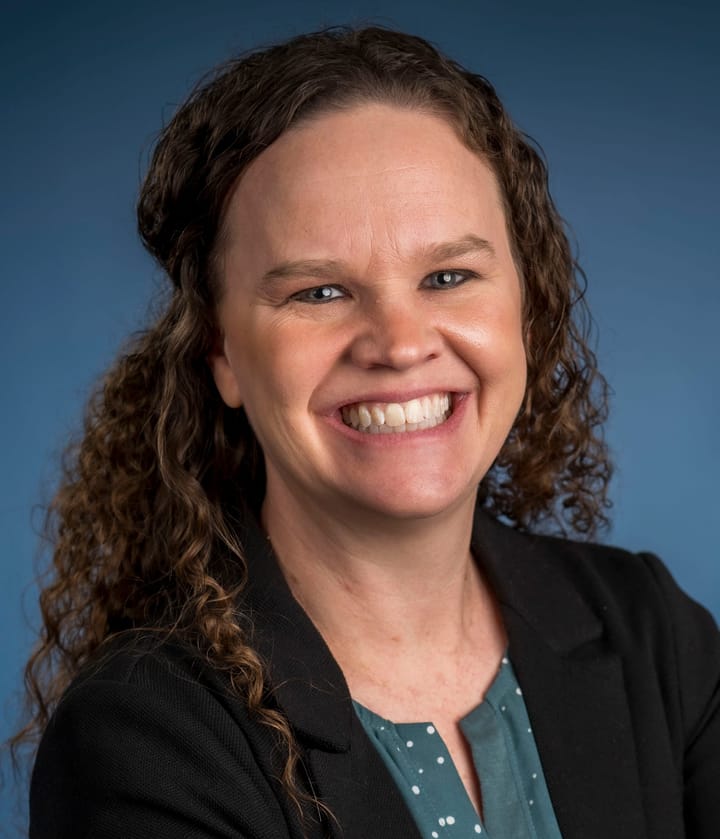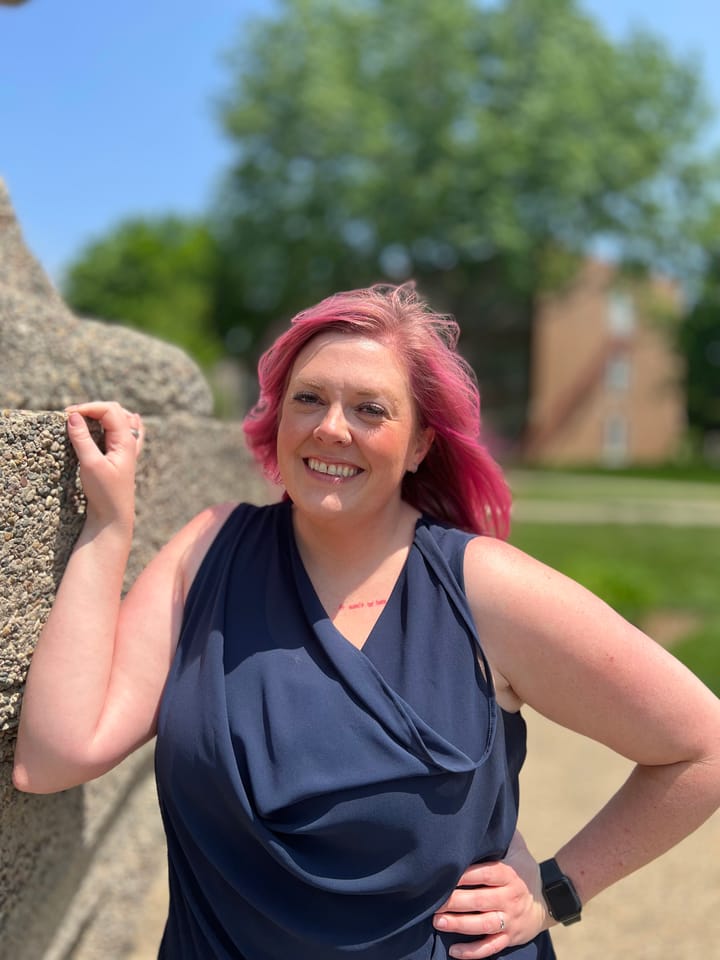ASA, Registrar discuss more inclusive graduation ceremony
MCKENNA BAUER TABBY MERKLE
mmbauer16@ole.augie.edu tjmerkle15@ole.augie.edu
ANNA STRITECKY STEPHANIE SANCHEZ
abstritecky15@ole.augie.edu sasanchez15@ole.augie.edu
Each year, thousands of people gather for Augustana University’s graduation ceremony. This year, students and staff are working to make logistical changes to elements of the ceremony to make it more inclusive.
Since the beginning of the academic year, the Augustana Student Association (ASA) has been working to incorporate a variety of graduation stoles to recognize and honor elements of students’ education beyond the classroom.
“This idea originated over the summer, and my committee and I have started taking it into fruition since the year started,” said ASA curriculum head Hailey Nold. “There have been many students that have expressed interest in having their graduation ceremony attire represent them beyond their academic achievements.”
Although Nold’s proposal was approved by ASA leadership, it still has to be reviewed by the Honorary Degree and Commencement Committee, which oversees any matter related to graduation.
Joni Krueger, Augustana’s registrar, says adding non-academic stoles detracts from the nature of the ceremony.
“Commencement is an academic event, and while the whole student experience is coming to a close, I do like this being thought of as an academic event,” said Krueger, who is a member of the Commencement Committee.
Krueger also says that the proposal, if implemented, could potentially cause logistical issues to both the people in charge of commencement and to the students or groups wanting cords.
She says that groups would have to consider funding and a process to get stoles approved, which would require the creation of a committee to review and process any stole that gets accepted.
“How would one draw the line as to what should or should not be okay at commencement?” Krueger said. “What if someone wanted a different color gown for their group? Which groups should or should not get to have cords? Who will do all the work to gather that information and write it up in the program to help those attending know why students have so many cords on? Does this diminish the recognition of the academic honors societies?”
Nold proposed this idea after hearing about the Sioux Falls School District creating inclusive actions for their graduating seniors. After approval from ASA executive leadership, Nold has contacted different administration members to try to make this possible.
“Right now it is still in the beginning stages in terms of approval from administration,” said Nold. “We’ve been working on solidifying what stoles we would want to propose, how stoles would fit into our core values and the opportunity cost of what these stoles mean to students at Augustana.”
Currently, all cords and stoles worn at graduation represent membership in honor societies, Latin Academic Honors such as cum, magna and summa laude, and covenant award recipients. Augustana recognizes academic honors as they weave into the liberal arts core value.
“For an Augustana student, their four years are created through so much more than honor societies and grades on paper,” said Nold. “Not that we want to discredit the accomplishments of these students, but only add to the individualization to each student’s credentials.”
Nold is proposing three stole additions into the 2019 graduation ceremony. The first proposed stole is a “Stole of Gratitude,” which a student can choose to wear in honor of someone who has impacted their journey while at the university and can give the person the stole after the ceremony.
The second, a “Study Abroad/International Stole” celebrates students who have chosen to study abroad for a semester or longer during their four years at Augustana or students that selected Augustana as their school of study while originally being from a different country.
Last, a “Tribute Stole” which can be worn to honor an active military member or graduating students who will join the military after graduation.
In addition to stoles, Nold and her committee have proposed a Native American Blanket Ceremony to honor the heritage students that celebrate their Native American culture.
This ceremony includes tribal representatives giving graduates a star quilt, performing the honor song and giving students a plume or an eagle feather to put in their graduation cap.
According to a Native American Augustana sophomore, Marissa Pacheco, the plume or feather, signs of achievement and honor, is blessed by a high official in the tribe.
“If Augie wants to be a diverse place, I believe it should be a reflection in our highest academic ceremony,” Pacheco said. “Augustana already has such a minimal Native American population, this would allow us to connect with any culture we’ve lost in our experience at the university.”
Nold is not the first to propose increased recognition at graduation. In the past, Augustana Campus Life has proposed stoles for those who have held a Residence Assistant position in campus housing, seeing that position had contributed to their college career.
(Click on gallery to enlarge photos and view captions.)
Although Nold’s proposal would officially make non-academic cords an option for graduating students, members of the African Student Union have been wearing medals in recognition of their time as students and club members for the past two years.
Ekram Tahir, former ASU’s board member and 2018 graduate, said the club made a tradition of giving medals to its graduating members.
ASU board members awarded the medals to all African graduates during the International Programs Office’s farewell and graduation ceremony. Tahir says the group didn’t ask for permission to do so, but they didn’t encounter any issues either.
“No one came to us and told us not to wear it,” she said. “People didn’t even notice.”
Sally Mallowa, biology professor and ASU’s faculty advisor, has been with the club since its founding in 2016. While she sees and understands both sides of the controversy, Mallowa says she is unsure on her stance.
“For some, graduating cum laude or summa cum laude is the main goal. For others, having the opportunity to graduate is the biggest honor,” Mallowa said.
Tahir says that giving club members something that embodies their involvement in non-academic activities motivates them.
“You’re a part of a club for so many reasons, but for a lot of people the main idea is to be a part of something,” Tahir said. “Getting a medal by the end of the year made me feel like I accomplished something. I was part of a bigger group.”
“By denying those who want stoles for things outside academia, do we tell them that the struggles they’ve overcome and challenges they faced aren’t important?” Mallowa said.
Mallowa’s main concern in adding more stoles is making students accomplishments appear lessened due to the amount of recognition. She echoes Krueger’s concerns in creating a way to present the potential recognition for graduation attendees, as well as maintaining an appropriate ceremony length.
“As a nation, we are suffering from ‘Participation Medal Syndrome.’ In wanting more students to have stoles and recognition for their achievements and journeys, do we lessen the achievement of those who receive academic stoles?” Mallowa said.
“We want to make sure that we acknowledge everyone, without handing out participation awards for the college experience,” Mallowa said.
Though the idea is still in the works, Nold believes that she has a steady foundation and support to accomplish this task to bring to graduation in May 2019.
“I’ll be discussing this with the Commencement Committee and those who make the executive decisions for graduation,” said Nold. “As a student and a representative on ASA, I stand strong on that each student experience here is more than a GPA.”
The Honorary Degree and Commencement Committee will decide on the proposal sometime during the spring.
ASA proposes adding Native American ceremony to commencement celebrations
The Augustana Student associated has proposed to add a Native American blanket ceremony as part of commencement celebrations.
Hailey Nold, ASA head of curriculum, spearheaded the plan and is working to have it approved by the Honorary Degree and Commencement Committee.
“I’ve noticed that the Sioux Falls Public School District honors this tradition, so I didn’t see why Augustana couldn’t,” said Nold. “ASA is always looking for ways to have students better represented, and this ceremony accomplishes that plus so much more.”
The tradition of blanket ceremonies, beading and the eagle feather have always been a part of Native culture.
The blanket ceremony consists of presenting a graduating student with a blanket and smudging sage on them as a way of honoring them.
Junior Marissa Pacheco, a Native American student from the Lower Sioux Tribe, says it would be interesting to get the ceremony started at Augustana, but she is also looking to get approval for Native American students to bead their caps and wear their feathers at graduation—which is currently not allowed.
“I think that the most important thing to do is to get that changed before starting a blanket ceremony,” Pacheco said. “A blanket ceremony is also important and would be great, but the wearing of the feather is so much more important for Native people.”
There have been many legal battles across the United States regarding Native American students not being allowed to wear an eagle feather at graduation.
In 2015, Christian Titman from the Pit River Tribe was denied by his school district to wear his feather. Titman’s family and Native American Rights Fund successfully sued the school district for violating his rights of freedom of expression and religion under the California Constitution.
According to a reportage from the Chicago Tribune, Superintendent Janet Young said the district’s graduation dress code was intended in part to avoid “disruption … that would likely occur if students were allowed to alter or add on to their graduation cap and gown.” Their reasoning is similar to Augustana’s policies for strict graduation dress codes.
Pacheco did not have any issues with her school regarding dress code for her high school graduation ceremony. She wore a medicine wheel, a plume, and beaded her cap.
For many Native Americans, eagle feathers remind them of their connection to the Creator.
“It is part of our religion to wear these things at graduation,” Pacheco said. “My school and the reservation kept close connections because most of the kids went to school there.”



